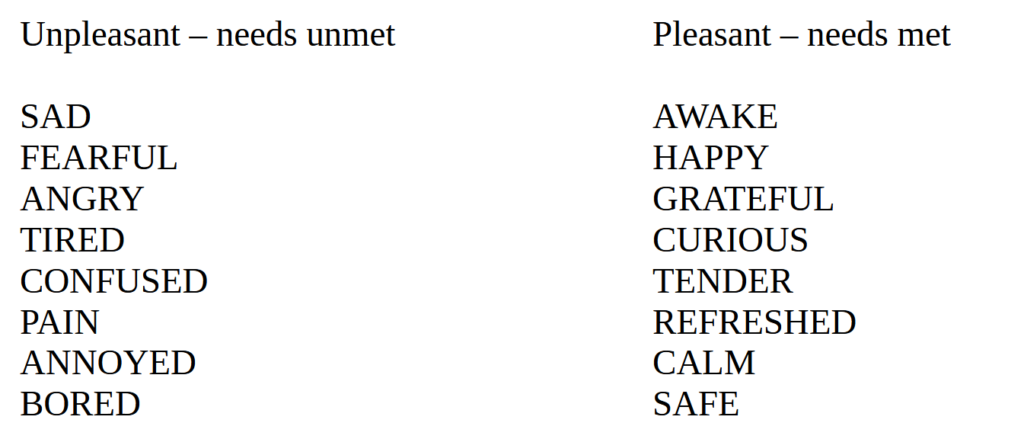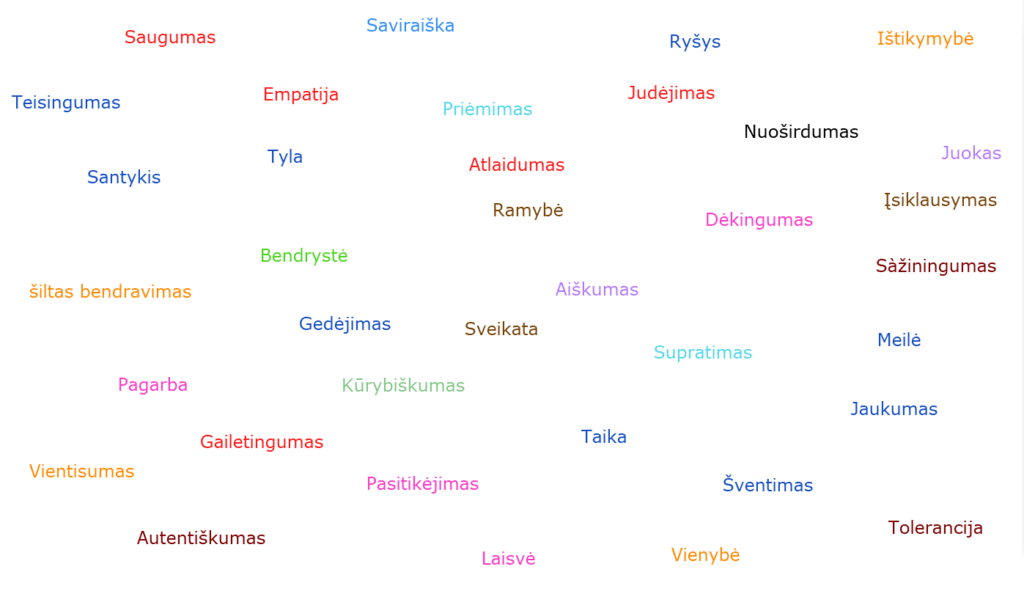Opening circle
Questions alive and from the learning of last time?
- NVC consciousness – please share about experiencing words as windows or walls in the last week.
- Did you experience the blocking of compassion through communcation during the last week?
- Observation vs. evaluations – Did you stop and try to make a neutral observation?
Chapter 4 – Expressing and Identifying Feelings
Feelings in Family, Education and Work place
In the book Marshall says he was never asked about his feelings in 21 years of his education. He understands that we learn most of all if other people think if we are behaving in the right or the wrong way.
Exercise 1 – Feelings in my Personal Past and Present – Breakout group 10 minutes
Share about your experience in a small group – How did you experience talking about feelings in your family, education and surroundings? Do you find difficulties in identifying feelings or expresssing them in your life.
Feedback from the breakout groups – 5 minutes
Feelings are sensations in our body
Unpleasant feelings – our body feels tense, constricted
Pleasant feelings – our body feels relaxed, not constricted

Language confusion about feelings
Often we use the word “feel” but we are actually refering to non-feelings – a thought, an assessment or even a hidden blame of what other people think of us or do to us.
Examples of the word “feel” expressing a non-feeling are:
“I feel that this project is going to fail badly.”
“I feel that I am not the right person for this kind of job.”
“Do you feel you have been lied to?”
“I feel they have ignored me from the start.”
“I feel like I am the only one who cares.”
Exercise 2 – Feelings vs. Non-Feelings – Breakout group
Circle the sentences from the list below where the speaker is expressing a feeling.
- I feel you don’t love me.
- I’m sad that you’re leaving.
- I feel scared when you say that.
- When you don’t greet me, I feel neglected.
- I’m happy that you can come.
- You are disgusting.
- I feel like hitting you.
- I feel understood.
- I feel good about what happened yesterday.
- I’m a genius.
Harvest, feedback, questions
Needs
What needs do we long for, to have a fulfilled life?
What would people need for a fulfilling community life?
Be it in the family, in a house community, in the village or city where they live or even in the country or the whole of our planet.
What kind of qualities are important to you?

Characteristics of NEEDS
- abstract (meaning non-concrete)
- universal – relating all humans and even all life on the planet
- a life force, that can be felt in the body, when we are connected with our heart
Need vs. Strategies
Needs are abstract.
But we often are aware and wish for something that has concrete elements in it – a strategy.
Example:
“I so long for a blue sky and sun! Finally … when will it be?!”

–A need can be filled by different concrete strategies.
I want to maintain my health:
I exercise, meditate and heal my toxic relationships,
see doctors, practice nonviolent communication
One and the same strategy can fulfill different needs, depending on the situation and the person.
Example:
“I so long for a blue sky and sun! Finally … when will it be?!”
A farmer might want to see his crops grow – financial safety is important to him.
Another person wants to get some color on their skin – it may fulfill their need for well-being.
A third person would find hope in the change of weather.
And the list of possible situation fulfilling different needs goes on. From the same strategy – blue sky.
What need would the strategy of a blue sky and sun fulfill for you now?
Game: NEED-STRATEGY-NEED
The first person picks a need they would like to fulfill and say: “I have a need for learning.”
The other people in the group suggest concrete actions, strategies, that might fulfill their need for learning. One person suggests: “How about going to learn a new language?” Another person suggests: “How about reading a historic book?” A third person suggests: “How about traveling to a country you have never been to?” Then the person with the need picks their favorite suggestion that might fufill their need for learning.
The game continues with a new need.

Using blame to get to needs
- He is a bad listener.
- You just start talking and lie.
- You’re not fully there, constantly looking at your smartphone.
Process steps
1. Name the need that is contained in the jackal
2. Connect to a situation where that need was fulfilled
3. Feel the feeling of the fulfilled need. Enjoy.
4. Connect to the situation where it is not fulfilled.
5. Feel the suffering in your body.
6. Bring your attention again to the fulfilled need. – You have a choice.
The Pain of Expressing Our Needs versus the Pain of Not Expressing Our Needs
Fear to express needs
Women and needs
Emotional Slavery
When we think we are responsible for the pain of another
Requests
Positive action language
Do not ask for what you do not want, ask what you do want.
First become aware of it, then learn how to express it.
Exercise 5 – Expressing Requests – Breakout groups
Circle the sentence number, where the speaker expresses a clear, positive action to be taken.
- I want you to understand me.
- I’d like you to tell me one thing that I did that you appreciate.
- I’d like you to feel more confidence in yourself.
- I want you to stop drinking.
- I’d like you to let me be me.
- I’d like you to be honest with me about yesterday’s meeting.
- I would like you to drive at or below the speed limit.
- I’d like to get to know you better.
- I would like you to show respect for my privacy.
- I’d like you to prepare supper more often.
Harvest, questions
Problems with exercise, or with making a request of your own and wanting support in expressing it.
Closing circle
Say one need that was fulfilled today.
